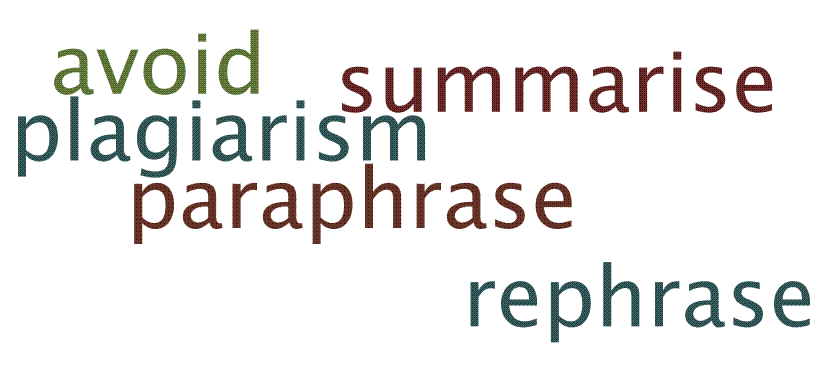Introduction
"I can understand the text, but I can't express the main ideas in my own words. And when I do try to do it, I'm not sure if I'm paraphrasing or summarising."
University of Auckland student

Some Definitions (from Collins Cobuild English Language Dictionary)
plagiarism (noun) The action of using or copying someone else's work or ideas without acknowledgement.
paraphrase (noun) An account, sentence, or expression that gives the meaning of another account, sentence, or expression in a different way. If you paraphrase something written or spoken, you give [the original meaning] using different words.
summarise (verb) If you summarise something, you give a short account of [a longer text], containing only the important points but not the details or examples.
rephrase (verb) to restate in other words.
quote (verb) to copy the exact words, using the same punctuation from the original passage.
Essential Tools in Academic Work
At university you are expected to read other people's research, and use their work as evidence to support your discussion. It is important that you express others' ideas in your own words while retaining the author's original meaning. Direct quotes can be used, however, to enhance your argument; otherwise, it is best to paraphrase the quote or summarise the ideas when you use other people's writing.
If you do draw on someone else’s work, ensure you acknowledge the original source and use the correct reference style. Doing this will help you avoid plagiarism.
You summarise a passage when you want to extract the main ideas only and use them as background material in your writing. A summary is usually much shorter than the original because the details are left out. You paraphrase a passage when you want to keep all the points in the original; therefore, the paraphrase is sometimes the same length as the source passage. You quote when you want to use the original author's exact words. NOTE:Summarising and paraphrasing are closely linked to understanding; you cannot do either if you do not understand what the author is saying.
- Learn more about integrating sources through paraphrasing, summarising and quoting.
- Discover how you can integrate the citation into your writing by embedding the author’s name into your text.
The main aim of this module is to explore some basic techniques for rephrasing, beginning with paraphrasing at the word and sentence levels, and then moving on to text-level paraphrasing. It is hoped that working through these techniques will give you confidence in using new sentence structures to rephrase ideas.





